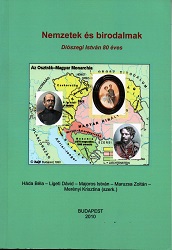
We kindly inform you that, as long as the subject affiliation of our 300.000+ articles is in progress, you might get unsufficient or no results on your third level or second level search. In this case, please broaden your search criteria.


Every Saturday for a period of two months, from the beginning of April till the end of June 1992, sessions organized by the Belgrade Circle were held at the Student Cultural Centre in Belgrade. At these sessions, ten in all, intellectuals, members of the Belgrade Circle and their quest – distinguished writers, scientists, artists, journalists, film and theatre directors, architects, actors, interpreters – expressed their own views of another, radically different Serbia. In times of anguish and affliction, the meetings, attended by a large assembly of listeners experiencing a kind of moral purification, were nonetheless imbued with a frail hope that there still might be a chance for a turn in events. With a desire to present ideas, opinions and sensations shared by the participants of the Belgrade Circle sessions to a much larger audience, the reading public, and to preserve them, because of their merit, in a more lasting form, discussions of over eighty intellectuals were compiled to form this book. In the meantime, the overwhelming disaster has reached its climax: »The Bosnian War«, still raging with no feasible way out as yet, exploded and blazed up like fire. The Belgrade Circle participants, distressed and abashed at the display of all those real or imagined evil deeds, so eagerly reported by the portentous heralds of death voiced hitherto often deeply hidden and silent feelings and thoughts about their burdensome disgust at the plague gripping and afflicting us all. Each participant contributed in his or her own way – rigorous scientific analysis, artistic susceptibility, eyewitness accounts, or simply. A public-minded desperate wail – to the shaping of one new, public opinion, the one that stirred in that sad Spring of ’92 and rebelled against the general fear, animosity, devastation, extermination, ethnic cleansing, forcible population exchanges... All those responsible and public-minded citizens, holding different political opinions, some members of various political parties, with incomparable personal experiences, varied professional interest and often of »objectionable« national origin, showed, however the will to insert tolerance among the basic principles of a humanized way of fife. But, in spite of the pronounced differences, their common aim, discernable in each and every speech imported to the audience, was to finally establish a community based on simple but as yet still unattainable ideals such as peace, freedom, tolerance and justice in place of degrading political, national and religious exclusiveness. Participants focussed their attention on various aspects of the problem: some analysed the roots of hatred and evil; some indicated the disastrous consequences of irresponsible national myth revivals; others warned of menaces yet to come unless we see reason in time. Some were stern, others witty and others still perhaps too prone to pathos, but they were all deeply concerned, and, as it unfortunately turned out, correct in predicting subsequent events. Therefore, individuals who take no notice of current, official policy and who have for a long time now tenaciously refused to render their talent and knowledge to the needs of the authorities, gathered round a project titled »Another Serbia«. Instigating a state of war and providing alleged erudite justification for the necessity of mutual extermination in the name of some noble goals, vague even to the very massacre executors, must not and cannot be the vocation of anyone who considers him or herself an »intellectual«, or earns a living acting as one. Hence, all session participants had but one desire: to mark out a path that may lead into a more promising future, to another, different, better and happier Serbia. »Another Serbia« soon became the synonym of resistance to fabricated lies, nationalistic madness, criminal war, a fascist holocaust, senseless destruction of villages and cities. Thanks are also due to the daily newspaper »Borba« which regularly reported on the Belgrade Circle Saturday sessions, and published a number of contributions presented there... We hope that the Another Serbia we all aspire to be easily discernable in the collection of essays presented in this book. The reader who hopes to find traces of at least some political program will be gravely disappointed. At present, when politics have poisoned the very soul of so many men of letters and knowledge, and when, among the most violent oppressors, in the ranks of all mortal enemy groups, one finds so many proud bearers of scientific degrees, who may actually be designated as men of unmerited and easily squandered reputation, it has become somewhat indecent to praise »intellectual pursuits«. The Belgrade Circle was, however, founded early in 1992 with the aim of retrieving dignity – another dangerous quality! – to public speech and conceived plans of action for the benefit of truth. We do not take an elitist position and stand indifferently above the crowd. On the contrary, being deeply involved and concerned, we place ourselves in its midst. The Association of Independent intellectuals insists upon its main goal, as declared in the program, namely, to bring together »critically oriented public figured who wish to unite their own civil and intellectual engagements with those of other, basically similarly oriented people«. That is why the Belgrade Circle will continue to »promote ideas, deeds and activities that affirm the values of a democratic, civil and plural society...« The Belgrade Circle will »encourage free and critical thought in all spheres of public life. It will support and help institutions and individuals who resist violence and animosity, and who plead for dialogue and for the survival of culture as the only humanly valid way of life«. Fine speeches? Maybe. Nevertheless, the Belgrade Circle has already, and despite many organizational and financial hardships, as well as ugly and unjust abuse from people who should have been, by the very nature of their vocation, in our ranks had they not knuckled under the burden of a more noble – national to be sure – mission, gained an undeniably high reputation. The words uttered with the aim of promoting »Another Serbia« and presented in this book to serve at testimony to the existence of a number of sensible people, shrewd and brave enough to resist suffocation by overwhelming absurdity, were not the only »weapon« used by Belgrade Circle members. They had also an active part in numerous civil and peace movements and events, thus contributing to the establishment of critical public opinion in Belgrade and Serbia: let us recall, for instance, the sad candles and our wake in the park, with souls colder than the Belgrade frost, while one of the past infernal wars – God, which one was it? – was raging out there somewhere; let us recall the »Black Band«, »Yellow Band«, »Student Protest ‘92«, and our endeavours to bring the people of Hrtkovci (»Srbislavci«) to reason; let us recall our guests from Pljevlja, Montenegro, Bosnia... All the time we were just launching our unhappy and, we believe, noble, though perhaps futile venture the very first participant said: let the Belgrade Circle begin it’s work! We hope that by offering this book to the public we have already come a long way.
More...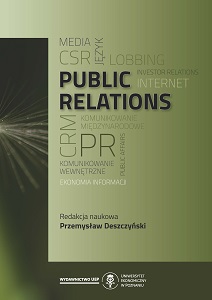
Międzynarodowe public relations należy traktować jako dziedzinę powstałą w konsekwencji zmian i wciąż pogłębiających się procesów zachodzących na arenie międzynarodowej. Globalizacja, mediatyzacja i demokratyzacja doprowadziły do powstania nowych aktorów w środowisku międzynarodowym, a także redefinicji roli państw od ośrodków administracyjnych do podmiotów konkurujących ze sobą w zglobalizowanej gospodarce. Umiędzynarodowienie życia gospodarczego wymaga dostosowania się do nowych warunków poprzez wdrażanie pewnych rozwiązań od strony praktycznej oraz pojęć w wymiarze teoretycznym, który ową praktykę stara się opisywać i wyjaśniać. W sytuacji coraz większej roli mediów funkcjonujących w skali międzynarodowej, pogłębiającej się demokratyzacji i globalnej konkurencji umiędzynarodowienie public relations zdaje się nieodzowne. Państwa i nowi aktorzy, do których zalicza się między innymi korporacje czy też organizacje międzyrządowe, konfrontując się z wyzwaniami, jakie stawia przed nimi współczesne życie gospodarcze, muszą podejmować się działań z zakresu międzynarodowych public relations, aby zyskać atrakcyjność i konkurencyjność w środowisku międzynarodowym. Dziedzina ta wykracza poza tradycyjne ujęcie public relations, ponieważ należy w niej uwzględnić różnice językowe, kulturowe i geograficzne. Istotne wydaje się także to, że ta dziedzina odgrywa niezwykle ważną rolę w perspektywie państw i organizacji międzyrządowych. Działania z zakresu międzynarodowych public relations tworzą dodatkową, pozornie nieuchwytną, wartość w postaci reputacji, miękkiej siły i marki kraju, co przekłada się na zaufanie, a w konsekwencji pozwala na wprowadzanie pozytywnych zmian, promowanie wartości, poprawę efektów ekonomicznych i budowanie pozycji podmiotu w środowisku międzynarodowym.
More...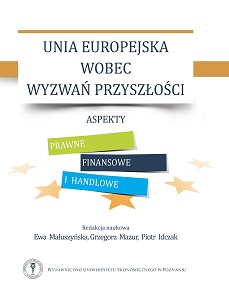
W ramach wspólnej polityki zagranicznej i bezpieczeństwa Unia Europejska stosuje sankcje mające wspomóc egzekwowanie jej celów, a zwłaszcza przestrzegania praw człowieka, demokracji i praworządności. Celem artykułu jest analiza skuteczności polityki sankcji Unii Europejskiej wobec Islamskiej Republiki Iranu. Zastosowaną metodą badawczą jest analiza porównawcza. Pierwsza część artykułu została poświęcona teoretycznemu ujęciu sankcji oraz czynnikom mającym wpływ na ich skuteczność. W następnym opisano podstawy systemowe wspólnej polityki zagranicznej i bezpieczeństwa Unii Europejskiej oraz zastosowanie sankcji jako jej elementu. W trzeciej części przedstawiono próbę oceny efektywności unijnej polityki sankcji wobec Iranu.
More...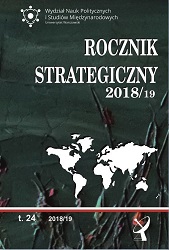
The aim of this article is to analyze the conflicts which were ongoing in 2018,in Yemen and Africa. The selection of armed conflicts was made on the basis ofthree main criteria: intensity, i.e. the scale of battle-deaths; internationalization, i.e.military involvement of third countries; the activities of jihadist groups. The articlediscusses armed conflicts in the Sahel region and the Lake Chad, in Libya, Somalia,and Yemen. As part of the Strategic Yearbook series that reviews current armedconflicts, this study is a continuation of the analyses from previous years. Its purposeis to explore the conditions and dynamics of the 2018 armed conflicts and theirimplications for international security. It explains the reasons of their increasingintensity and internationalization. The expansion of jihadist groups, especiallythose related to IS (Islamic State of Iraq and Levant, the so called Islamic State) orAl-Qaeda (AQ), is perceived as an important factor in this regard. It is argued thatthe activity of armed jihadist groups leads also to greater military involvement ofWestern states.
More...
The article offers an analysis of the most important energy market trends from theperspective of their importance for energy security and climate change. The energyand climate systems are two areas of human activity strongly influencing each other.On the one hand, the way energy is produced and consumed influences the globalclimate system, on the other hand, climate policy impacts energy security. The articletherefore focuses on the directions and dynamics of changes taking place in theenergy sector and which are of particular importance for global reductions of CO2emissions. It gives an insight into the policies of the world’s largest consumers offossil fuels and into the extent to which their activities favour energy transformation.This analysis critically assesses the feasibility of achieving the global climate policytargets set in 2015 in Paris. Especially importantly for the Strategic Yearbook, the2018 events and current trends serve as points of reference: the article outlines theconditions and results of climate negotiations of COP24 held in Poland and thenewest IPCC report on Global Warming of 1.5°C. An analysis of demand-supplytrends, recent trends in the area of CO2 emissions as well as current events leads toconclusions concerning some long-term challenges for energy and climate security.
More...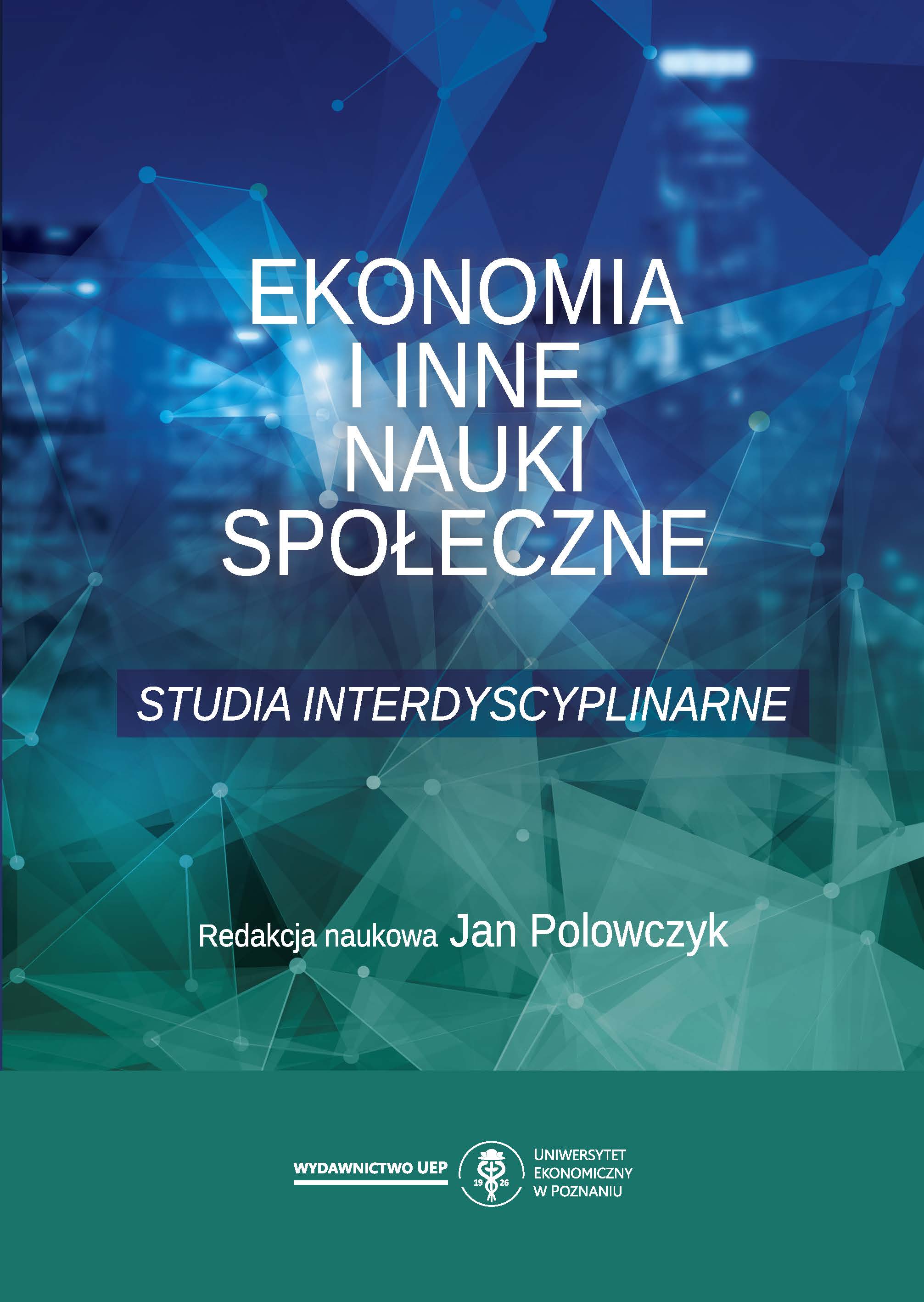
The study contains an attempt to answer two questions. First: why does war, which seems to be completely contrary to the idea of humanism and the essence of humanity,remain an integral element of the world around us? The second question is: why the war, and not the cold one but the hot one, returned to Europe? An attempt to answer the above questions has been set in the current socio-political and economic contextand what the author defines – following Robert Kagan (2009) – as the period of the return of history.
More...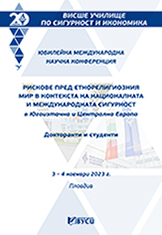
This paper analyses neo-Ottomanism as an ideological current that aims to revive Turkey's Ottoman heritage, which seeks to combine modern statehood with traditional values and regional influence. Neo-Ottomanism stresses Turkey's importance as a worthy successor to the Ottoman Empire and its role as a bridge between East and West. In order to improve its international standing, Turkey needs to rethink and publicly acknowledge its historical and geographical identity. The approaches presented highlight Turkey's ambitions to rebuild cultural ties and establish new economic and political relations in the region. While neo-Ottomanism can contribute to greater regional cooperation, it also brings challenges related to historical grievances and the need to realign political alliances.
More...
The region of South Eastern Europe has long history dating back in the past of numerous armed conflicts provoked by ethnic and religious intolerance. The unstable ethno-religious situation was the legacy left after the dissolution of the Ottoman Empire – a long process which started in the 19th century and officially ended in 1922. Another crucial moment that brought much instability to the region and especially to the Western Balkans was the breakup of Yugoslavia in 1992 and the Yugoslav wars that came as an aftermath. Today the region is a more peaceful place due to the fact that all the countries initiated their European integration. Important factors for the stabilization of the situation are also the improvement of the economic stability and the energy integration between the countries from the region. The economic and energy interdependence is the most solid guarantee that the conflicts from the past will not repeat themselves.
More...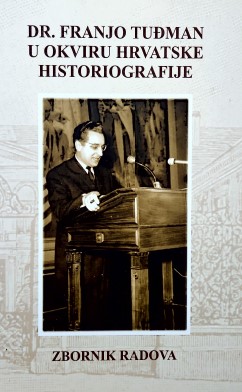
Ivo Pilar, Ph. D., (1874-1933), attorney-at-law, completed his brochure The World War and the Croats (Svjetski rat i Hrvati) in March 1915. It was published in Zagreb that same year. Knowing that the authorities of the Austro-Hungarian Monarchy would not be pleased with some of his theses, Pilar published the brochure under the pseudonym Dr. Juričić. The author’s fears of a possible negative reaction to his geopolitical ideas were not ungrounded, since the state’s censor abridged Pilar’s original text thoroughly before he allowed it to be published. The second edition of Pilar’s brochure, containing many sentences that had been censored out of the first edition, most of them pertaining to the Central Forces’ unfaithful ally Italy, was published two years later. In his analysis of the political situation at the beginning of World War I, Pilar concluded that the times were fateful for the Croatian people, since the outcome of the war was going to decide with which country the Croatian territories would side in the long run. Tuđman felt that Pilar’s views were a reflection of the ideas of all the factions in Croatian politics that sought to solve the Croatian national question within the confines of the Austro-Hungarian Monarchy and within the Central European geopolitical territory. Even though Pilar’s basic hypothesis had proved wrong (he assumed Germany and Austro-Hungarian Monarchy would win World War I), some of his ideas, particularly the ideas about the geopolitical position of Croatian territories and their historical fate, still hold their original value.
More...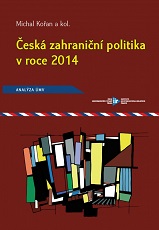
Českou zahraniční politiku ve vztahu k Rusku v roce 2014 přirozeně poznamenaly především události ve východní Evropě, jejichž významným účastníkem Rusko bylo. Tyto události byly přímým pokračováním dění na Ukrajině postupně gradujícího na podzim a v zimě 2013. A tak zatímco na počátku roku 2014 ještě čeští političtí představitelé ve vztahu k Putinově Rusku řešili na pozadí dramatizující se ukrajinské krize otázku, zda se účastnit olympijských her v Soči, minimálně od února 2014 bylo jasné, že budou muset ve vztahu k RF zaujímat postoje v daleko závažnějších otáz-kách a že vztahy Ruska a té části světa, jejíž součástí se ČR cítila již téměř 25 let být, se postupně dostanou do největší krize od dob skončení studené války. V české za-hraniční politice vůči Rusku se tak v průběhu roku 2014 postupně promítaly nejzávažnější události: na jaře to byla anexe Krymské autonomní republiky ze strany RF a dále postupný prudký nárůst napětí a násilí na východní a jihovýchodní Ukrajině a otázka ruského angažmá v celé situaci. Ačkoli do této události nebyla přímo zaan-gažována, dotkl se jí (podobně jako zbytku světa) i moment, kdy konflikt na Ukrajině vstoupil do povědomí veřejnosti řady států, i těch, které do situace nebyly zainteresovány prakticky vůbec: tragédie letu MH17.
More...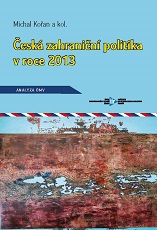
Balkán má v české zahraniční politice specifické postavení. V devadesátých letech se Česká republika aktivně zapojila do procesu bezpečnostní stabilizace v oblasti bývalé Jugoslávie, zejména prostřednictvím NATO. Později začala být pozornost věnována politické a hospodářské stabilizaci tohoto prostoru. Po konferenci EU se zeměmi západního Balkánu v Soluni v roce 2003 začal být proces stabilizace balkánského regionu v české zahraniční politice explicitně spojován s integrací jednotlivých zemí do EU a NATO. Také v Koncepci zahraniční politiky (dále jako Koncepce) schválené v červenci 2011 je integrace zemí západního Balkánu do EU a NATO označena za dlouhodobou zahraničněpolitickou prioritu ČR. Balkán však nebyl nikterak zmíněn v programových prohlášeních vlád Mirka Topolánka v roce 2006 a 2007, ani v prohlášeních úřednických vlád Jana Fišera v roce 2009 a Jiřího Rusnoka v roce 2013. Bezpečnostní, politická a hospodářská stabilizace Balkánu prostřednictvím integrace jednotlivých zemí do EU a NATO tedy představuje dlouhodobou, ale nikoli naprosto zásadní prioritu české zahraniční politiky.
More...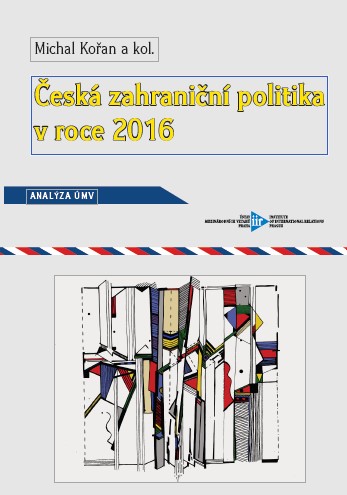
Česká zahraniční politika ve vztahu k Ruské federaci (RF) byla v roce 2016, stejně jako o rok předtím v roce 2015, ovlivněna především napjatou geopolitickou situací mezi Ruskou federací a západními státy a nevyřešeným konfliktem na východě Ukrajiny, ve kterém se Rusko od počátku vojensky angažuje. Vzhledem k tomu, že se ne-podařilo zastavit boje na východní Ukrajině a po celý rok 2016 docházelo z obou stran k opakovanému porušování minských dohod, které mají vést k vyřešení zostřené situace na východě země, a na jejichž dodržování a plnění jsou vázány unijní sankce uvalené na Rusko, rozhodla se Evropská unie (EU) prodloužit protiruské sankce. V porovnání s předchozím rokem 2015 pak vyvolala otázka prodloužení sankcí v České republice v roce 2016 daleko intenzivnější politickou debatu. Dalším faktorem ovlivňujícím českou zahraničněpolitickou debatu o Rusku byla jednak pokračující vojenská podpora vládnoucímu režimu Bašára Asada v Sýrii, za kterou RF čelila opakovaně mezinárodní kritice, a zároveň hrozba „hybridní“ angažovanosti Ruské federace v Pobaltí společně s údajnou kybernetickou aktivitou a dezinformační kampaní v zemích střední a východní Evropy.
More...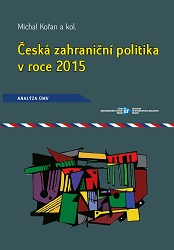
Česká zahraniční politika ve vztahu k Ruské federaci (RF) byla v roce 2015, stejně jako o rok předtím v roce 2014, nadále ovlivněna napjatou geopolitickou situací mezi Ruskou federací a západními státy a nevyřešeným konfliktem na Ukrajině. Po eskalaci bojů na počátku roku 2015 došlo 12. února v Minsku k uzavření nových dohod, které měly doplnit minský protokol ze září roku 2014. Tyto dohody představovaly plán, jenž měl ke konci roku 2015 vést k vyřešení ozbrojeného konfliktu na východě země. Nicméně ke konci roku 2015 byl pokrok minimální. Sankce uvalené na Rusko, jejichž osud je pevně spojen s plněním dohod, byly tak prodlouženy, což ovšem v České republice nevyvolávalo takové debaty, jak tomu bylo v předcházejícím roce.
More...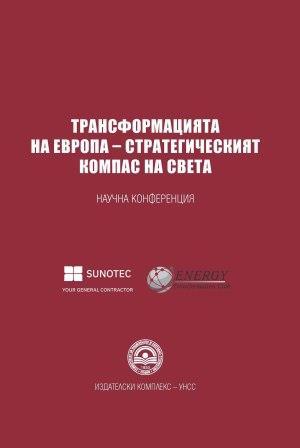
The European citizen expect from the German economy to become a proof of concept for the real energy transformation process, migrating from fossil power generation and nuclear power plants to a carbon neutral energy industry. By the utilization of the vision for the Green Deal in Europe – ending nuclear, coal and gas energy use simultaneously is an ambitious approach. It is nevertheless the obligation of the decision makers to preserve our planet and solve the imminent threat posed by climate change. Germany’s new government imperatively has to find answers on how to secure supply, limit the economic impact of this transition and diversify our energy sources throughout Europe. Tendencies – especially among the currently governing party, the Greens – to reject certain options out of pure ideology must be overcome in order to find the best solutions. The following overview is focused on the critical processes in the German economic model related to the post-COVID and Ukraine crisis and the response needed to remain on course towards the green transition.
More...
Ever since the dawn of men, there has been a captivation with distant stars and the blue sky. The ideological competition between the two superpowers, the Soviet Union and the United States leads to remarkable discoveries and extraordinary accomplishments in outer space. The culmination of this contest was humanity’s first step on the Moon and the widely accepted American victory against the Soviet Union in the first Space Race. Fifty-three years later, the fascinating nature of outer space still prevails with new participants looking to make their mark and an old competitive nature still driving human progress. The geopolitics of space since the beginning of 2022, have had alternating dynamics, due to various factors, perhaps leading to significant vicissitudes in the balance of power.
More...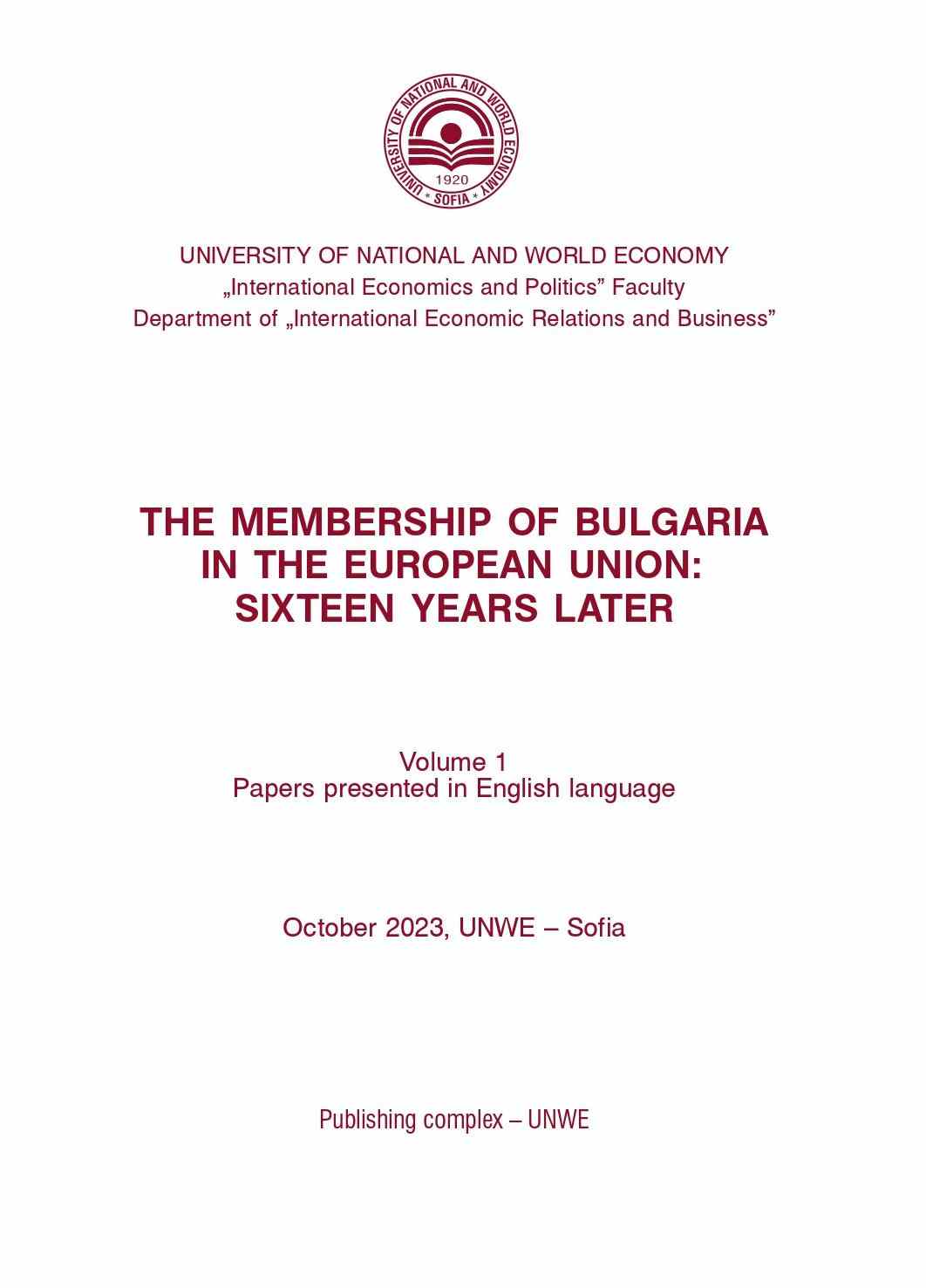
The world changes rapidly due to discoveries and innovations in the field of technology. The interests of the BRICS countries and their common goals intersect to move towards new global economy and to lay the foundations of a multipolar international system. In order to accomplish such a goal, the BRICS group faces the challenge of conducting organizational activities. The significance of the ‘five’ countries in the world economy increases with their joint efforts as a geopolitical group. The economic success of the five states ensures their active role in the UN, IMF, WB, WTO. The present study aims at demonstrating how the historical geopolitical change takes place highlighting its real and objective reasons related both to the development of the world economy and the alteration in the structure and fundamentals of international relations in the 21st century with the emergence of new political economic organizations and alliances.
More...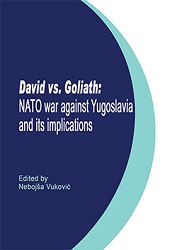
The paper is focused on the ideological frame of Russian Post-Soviet Foreign Policy in the Balkans. Is there any Russian soft power? In a short introduction, the main ideological and geopolitical tendencies in the presentday Balkans are outlined. In the first part of the paper, we describe the geopolitical reality of the Balkans today and Russian positions in it. In the second and the third part of the paper, we analyze the content and the transformation of the Russian idea/concept ‘Russkiy mir’ and geopolitical, ideological and spiritual consequences of that transformation. The fourth part of the paper describes the current state of relations between NATO and Serbia 20 years after the bombing of the FR Yugoslavia in the context of the geopolitical competition of old and new factors in world politics. The conclusion highlights the main geopolitical and spiritual challenges of some Balkan Orthodox peoples and the possible role of Russia in the Balkans.
More...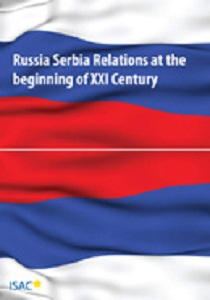
2009 – the crisis year – brought about crucial changes in the established and seemingly successful picture of the oil market. The New Year “gas war” between Russia and Ukraine consolidated bad tradition, demonstrating the vulnerability of the present structure of the oil and gas market once again. There were no winners, everyone suffered: the supplier, the transporter and the consumers. Conclusions and assessments of the conflict, and its consequences, are, generally, diametrically opposed. This was reflected in the subsequent actions and statements of the players in the market. It seems generally considered that on the ‘gas front’ Russia is leading a war “against all”. This confrontation is not new; but if earlier it could be considered as “debatable”, now resentment towards the actions and positions of Moscow are reaching a kind of hysteria. Such a political context, alongside some recent events, certainly has an influence on the future of the energy security in Europe, especially considering dramatic changes in the oil and gas markets.
More...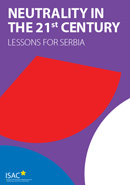
I will make an attempt to briefly present the key determinants and content guidelines of the Yugoslavian non-aligned policy, but also to indirectly indicate the contact points and differences between this policy and the concept of neutrality itself. After a period of uncritical glorification, followed also by euphoric satanization of the non-aligned concept, finally the time has come, based on relevant archive material, to provide real answers, at least to some elementary questions in this field. Some of them are: if this policy was in fact desired or forced; how difficult was it to prompt sometimes unwilling partners who were not belonging to neither of political-military blocks to cooperate, and finally, why Yugoslavia distanced itself from Europe and connected to far away and unknown civilizations.
More...